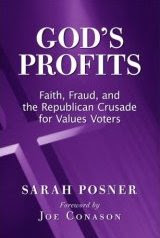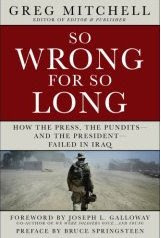(1) In light of the standards governing media campaign coverage, John McCain's ties to religious extremists -- including those with a lengthy list of fringe and reprehensible views -- remains one of the most under-reported stories. Evangelical leader Rod Parsley, whom McCain has called his "spiritual guide," has a long history of repugnant "anti-American" statements, and has repeatedly accused the U.S. Government of being guilty of "black genocide" (as a result of its abortion policies). And McCain actively sought the endorsement of radical minister John Hagee, and then shared a stage with and lavished praise on him.
 Sarah Posner, a columnist at The American Prospect, has written the definitive expose on this "new wave" of radical Christian ministers with whom the GOP and the McCain campaign are so inextricably aligned. Her book, entitled God's Profits: Faith, Fraud, and the Republican Crusade for Values Voters, comprehensively documents both the growing influence of these Christian radicals in Republican politics and their far out-of-the-mainstream core views. I spoke with Posner last week regarding her book and what ought to be the much more significant controversy over McCain's embrace of these religious fanatics. That discussion can be heard here.
Sarah Posner, a columnist at The American Prospect, has written the definitive expose on this "new wave" of radical Christian ministers with whom the GOP and the McCain campaign are so inextricably aligned. Her book, entitled God's Profits: Faith, Fraud, and the Republican Crusade for Values Voters, comprehensively documents both the growing influence of these Christian radicals in Republican politics and their far out-of-the-mainstream core views. I spoke with Posner last week regarding her book and what ought to be the much more significant controversy over McCain's embrace of these religious fanatics. That discussion can be heard here.
Paul Rosenberg at Open Left also hosted a blog discussion with Posner this week. The more attention paid to Posner's examination of these GOP radicals, who are key McCain allies, the better.
(2)  Speaking of crucial political topics that have received virtually no attention from the establishment press, Greg Mitchell, the Editor of Editor & Publisher, has just released a new book covering one of the most significant and under-reported topics of the last decade: the profound failures of the establishment press with regard to the Iraq War. Mitchell's book -- So Wrong for So Long: How the Press, the Pundits -- and the President -- Failed on Iraq -- is one of the very few historical accounts of the media's role in actively enabling both the invasion and the tidal wave of government falsehoods regarding the subsequent occupation. I spoke with Mitchell regarding several of the topics in his book, which can be heard here.
Speaking of crucial political topics that have received virtually no attention from the establishment press, Greg Mitchell, the Editor of Editor & Publisher, has just released a new book covering one of the most significant and under-reported topics of the last decade: the profound failures of the establishment press with regard to the Iraq War. Mitchell's book -- So Wrong for So Long: How the Press, the Pundits -- and the President -- Failed on Iraq -- is one of the very few historical accounts of the media's role in actively enabling both the invasion and the tidal wave of government falsehoods regarding the subsequent occupation. I spoke with Mitchell regarding several of the topics in his book, which can be heard here.
(3) Speaking of books, in connection with the release of my new book in a couple of weeks, I will be at numerous events throughout April in various cities -- including, at least, Washington, New York and Miami. I'll post the details for those events as the dates approach, but if you're interested in arranging for other events in April -- speeches, book talks, campus events, media appearances and the like -- you can email me or Ava Kavyani at Crown. It's possible that other cities will be added depending on the events.
(4) The joyous weekend slumber party which much of the press corps attended at John McCain's "cabin" in Sedona, Arizona a few weeks ago (which is, in fact, owned not by McCain but by his second wife's family) received some attention, but Bob Somerby reminds us of an even gaudier and more inappropriate media celebration for John McCain back in 2004. As you read that, consider the observation from Hunter Thompson in his famous 1973 book compiling his Rolling Stone articles, Fear and Loathing on the Campaign Trail:
The most consistent and ultimately damaging failure of political journalism in America has its roots in the clubby/cocktail personal relationships that inevitably develop between politicians and journalists. When professional antagonists become after-hours drinking buddies, they are not likely to turn each other in. . . . especially not for 'minor infractions' of rules that neither side takes seriously; and on the rare occasions when Minor infractions suddenly become Major, there is panic on both ends.
The sheer reverence which much of the establishment press harbors for McCain, and the way it colors their coverage, will be one of the most significant factors in shaping events in this election.
(5) It's the second time he has made such a comment, but George Bush's chest-beating claim last week that he wishes so very much that he could be fighting on the front lines in Afghanistan, and that it must be so adventurous and "romantic" to do so, really does encapsulate -- for reasons set forth here -- the neoconservative "worldview at its absolute purest." (Along the same lines, it's worth asking why the nation's most boisterous faux-warriors and most vigilant opponents of America's "feminization" so frequently find themselves in predicaments like this).
The Washington Post's Dan Froomkin labeled Bush's previous such statement "Bush's Battlefield Envy," and this childish though destructive love of war (fought always by others) continues to define the core of the GOP. That supreme war-cheerleader Joe Lieberman is John McCain's most cherished and trusted Middle East adviser demonstrates that fact as clearly as anything could. Watching McCain this week continuously assert falsehoods about Iran in order to wildly exaggerate the threat that country poses -- and then seeing him stand in Israel and mindlessly repeat whatever Joe Lieberman whispered in his ear -- is a rather potent, and disturbing, harbinger of what a McCain presidency would mean for the country.
(6) McCain's Hero status by virtue of his time in Vietnam is, of course, a central prong in the media's adoration for him. They have, however, thus far demonstrated little interest in exploring some of the more ambiguous aspects of McCain's Vietnam experience. Cernig takes a look at one such aspect here.
There's no question that much of McCain's conduct back then was admirable, though I don't think that what John McCain did 40 years ago in Vietnam ought to be relevant one way or the other for the election. But the excuse used for the 2004 Swift Boat obsession was that Kerry's war service was being heralded by his supporters and was thus fair game for investigation (just as the wealth of Kerry's second wife was fodder for much gossip and derision). Lowly media behavior becomes that much worse when applied in a one-sided manner.
(7) It is probably too early to know with certainty, and there are always risks in trying to reach conclusions based on one or two polls, but Steve Benen (here and here) examines polling data strongly suggesting that the manufactured Wright "controversy" will do very little long-term damage to Obama's candidacy. Eight months is a long time -- there will be all sorts of scandals and other crises between now and the election. If Obama beats Clinton for the nomination, even relatively low-information voters will have plenty of exposure to Barack Obama himself, as well as to John McCain, and they won't have to use Wright or anyone else as a second-hand proxy for forming their views of what Obama is like.
First-hand exposure to Hillary herself had the effect of causing many voters to shed the more absurd caricatures of her that long spewed from the right-wing noise machine. A similar effect will almost certainly occur with first-hand, sustained exposure to Obama -- in the form of speeches, ads, debates, etc. Just as happened with Hillary, the more the average voter sees of Obama, the more they will form their views based on Obama himself.
(8) This is probably the most potent -- and the most accurate -- attack on the McCain candidacy. There just are no notable differences in foreign policy outlook between McCain and the defining Bush/Cheney doctrine, except that McCain may be even more belligerent and willing, even eager, to consider the use of military force as a top option in resolving disputes. Only with the press corps that we have could a candidate who is so plainly nothing more than a third term for George Bush -- one of the most despised presidents in modern American history, plagued by recession and a deeply unpopular war -- have a plausible chance of winning. But we do have the press corps that we have, and therefore McCain does have a chance of winning, as irrational as that is.



Shares